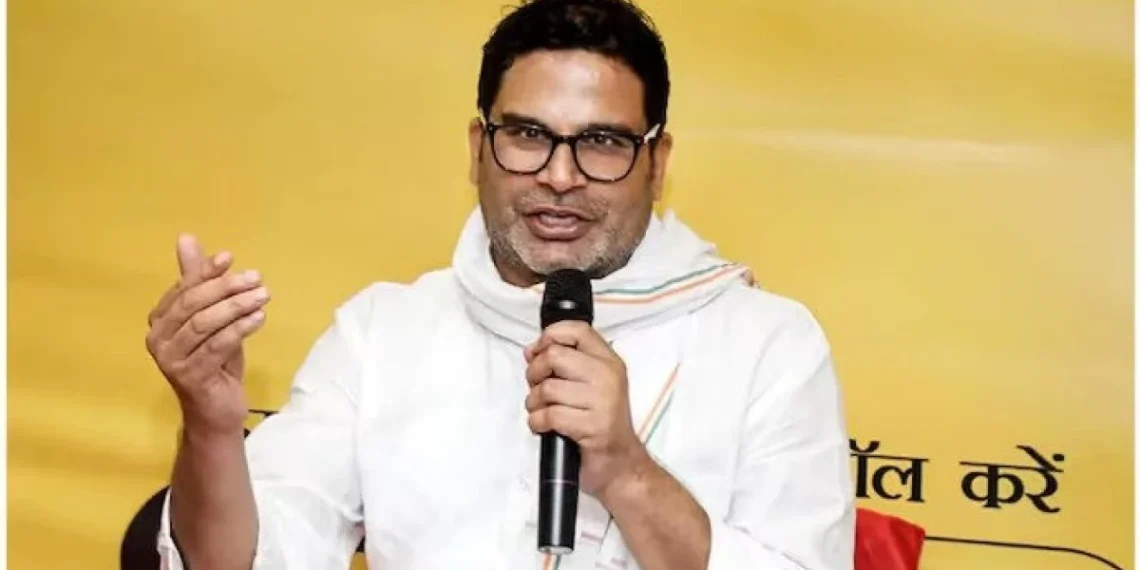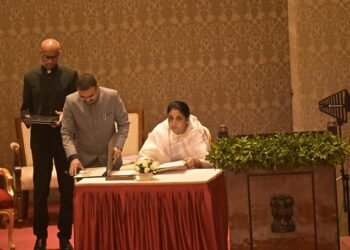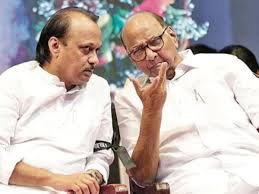The 1995 Tarapur massacre and recent financial irregularities reignite debate on accountability, judicial ethics, and constitutional morality in Bihar.
By Navin Upadhyay
September 30, 2025 – The Bharatiya Janata Party (BJP), for long projecting itself as the “party with a difference” for its so-called zero-tolerance stance on crime and corruption, faces a defining moment in Bihar. Jan Suraaj Party founder Prashant Kishor, popularly known as PK , in a scathing press conference on September 29, accused Deputy Chief Minister Samrat Choudhary of evading justice in the 1995 Tarapur massacre through alleged age forgery, demanding his immediate resignation and arrest.
The allegations, rooted in a decades-old murder case and amplified by fresh claims of corruption, challenge the BJP’s moral high ground and its proposed legislative measures to disqualify arrested ministers and even the Prime Minister from office. Introduced in the Monsoon Session of Parliament (August 2025), these bills – now under Joint Parliamentary Committee (JPC) scrutiny – underscore the party’s commitment to accountability.
As Kishor’s accusations gain momentum, the question looms: Will the BJP enforce its anti-crime rhetoric by compelling Choudhary to step down, or will political expediency protect the “tainted’ leader ? With Bihar’s 2025 Assembly polls on the horizon, this saga could reshape the state’s volatile political landscape.
READ: Opinion: This Is One Arrest That Will Haunt the Regime Forever
The Allegations: A Murky Past Resurfaces
The 1995 Tarapur massacre (Case No. 44/1995, Tarapur police station, Munger district) remains a grim chapter in Bihar’s history of caste violence. Seven members of the Kushwaha community – Choudhary’s own caste – were killed in a brutal clash during the lawless era of Lalu Prasad Yadav’s Rashtriya Janata Dal (RJD) rule. Rakesh Kumar, alias Samrat Chandra Maurya (now Samrat Choudhary), son of former minister Shakuni Choudhary, was named a prime accused and briefly jailed.
Kishor alleges that Choudhary’s release hinged on a fabricated claim of juvenile status. Documents submitted to the Chief Judicial Magistrate (CJM), citing a Bihar School Examination Board (BSEB) admit card, listed his date of birth as May 1, 1981, making him 14 in 1995 and eligible for protections under the Juvenile Justice Act, 1986. The Supreme Court reportedly upheld this, granting relief. However, Kishor points to Choudhary’s 2020 Bihar Legislative Council election affidavit, which declares him 51 years old – implying he was 26 in 1995, an adult ineligible for juvenile leniency.
“This is not just evasion; it’s perjury before the highest court,” Kishor charged, vowing to petition the Governor for Choudhary’s dismissal and urging police action.
Kishor further linked Choudhary to the 1999 Shilpi-Gautam rape-murder case in Patna, later closed by the CBI as suicide.
जिसे जेल में होना चाहिए, वो आज बिहार के उप मुख्यमंत्री की कुर्सी पर बैठा है!! pic.twitter.com/cnQ53Ff3ZD
— Jan Suraaj (@jansuraajonline) September 29, 2025
Legal Framework: Can Choudhary Be Arrested, and Must He Resign?
The allegations test the BJP’s proposed Criminal Law (Amendment) Bills, introduced in the Monsoon Session of Parliament (August 2025) by Home Minister Amit Shah. These bills, including the Constitution (130th Amendment) Bill, 2025, and amendments to the Government of Union Territories Act and Jammu & Kashmir Reorganisation Act, seek to disqualify ministers, including the Prime Minister, arrested for serious offenses (punishable by five years or more) and held in custody for 30 consecutive days without bail.
READ: Talks Collapse as Leh Apex Body Protests Wangchuk Arrest, Deaths
Automatic removal would occur on the 31st day, with the President or Governor acting on ministerial advice if no resignation is tendered. Now under a 31-member JPC for scrutiny, with a report due by the Winter Session, the bills emphasize that “a Minister facing serious criminal offences… may thwart constitutional morality.”
Legally, Choudhary enjoys no immunity from arrest. Article 361 of the Constitution shields only the President and Governors from arrest during their term, explicitly barring “any process for the arrest or imprisonment” of these heads. Deputy Chief Ministers, like other ministers, are treated as government officials, amenable to arrest for non-official offenses under the Bharatiya Nagarik Suraksha Sanhita (BNSS), 2023, which replaced the Code of Criminal Procedure (CrPC), 1973.
Section 35 BNSS (replacing Section 41 CrPC) allows warrantless arrests for cognizable offenses like murder (Section 103, Bharatiya Nyaya Sanhita (BNS), 2023, replacing IPC Section 302) or criminal conspiracy (Section 61 BNS, replacing IPC Section 120B), provided “reasonable suspicion” exists, such as flight risk or evidence tampering. For high-profile figures, agencies like the CBI typically secure court warrants to avoid “arbitrary” action, as mandated in Arnesh Kumar v. State of Bihar (2014). D.K. Basu v. State of West Bengal (1997) outlined 11 arrest guidelines, emphasizing dignity and family notification, with violations inviting contempt; these remain applicable under BNSS.
Kishor’s forgery allegation invokes Section 335 BNS (replacing IPC Section 193, fabricating false evidence) and Section 340 BNS (replacing IPC Section 471, using forged documents), both cognizable and arrestable offenses carrying up to seven years’ imprisonment. If proven, this could trigger Section 528 BNSS (replacing Section 482 CrPC) to quash the earlier juvenile relief, reopening the 1995 murder case for re-trial.
Precedents support this: J. Jayalalithaa was convicted mid-term as Tamil Nadu CM (2014) and ousted under the Representation of the People Act, 1951; Hemant Soren resigned post-arrest in 2024; Chandrababu Naidu was jailed as ex-CM in 2023. Lily Thomas v. Union of India (2013) mandates immediate disqualification for convicted legislators, though mere charges don’t bar office – but moral turpitude demands ethical resignation.
Article 164(1) vests the Governor with discretion to appoint or remove ministers, but no law compels resignation unless convicted. The Madras High Court, in a 2023 case involving a detained Tamil Nadu minister, noted that a jailed minister cannot govern effectively, urging resignation to preserve public trust.
A Constitution Bench hearing Manoj Narula v. Union of India (2014)’s urged PMs and CMs to exclude those facing heinous charges (murder, rape, corruption) to uphold “constitutional morality,” with CJI R.M. Lodha warning: “The Prime Minister… is expected to act with constitutional responsibility,” noting that such appointments erode public trust.
READ:
#WATCH | Patna: On the statement of Jan Suraaj founder Prashant Kishor, Bihar Deputy Chief Minister Samrat Chaudhary says, “…In 1995, we were thrown into jail. 22 members of our family were in jail. Bihar’s Chief Minister Nitish Kumar walked 7 kilometres on foot to protest for… pic.twitter.com/ISOsqo4oVk
— ANI (@ANI) September 29, 2025
BJP’s Litmus Test: Walking the Talk or Protecting an Ally?
The BJP’s rhetoric of clean governance, amplified by its oft-repeated rhetorics against Lalu’s “jungle raj,” faces intense scrutiny. Kishor’s dare – “Dismiss or release all accused from jails” – exposes contradictions, especially as Chief Minister Nitish Kumar rails against the “3-Cs” (Crime, Corruption, Communalism). Choudhary, a Kushwaha leader and potential CM face, is pivotal for BJP’s caste arithmetic in a state where 40% youth unemployment and fading “Saat Nischay” promises fuel discontent. Shielding him risks alienating voters wary of corruption’s return.
Choudhary’s defense – calling the allegations “baseless” and tied to 1995 when his father led the Samata Party – leans on a claimed acquittal but sidesteps the forgery charge. BJP’s media cell brands Kishor’s move “desperation,” but silence from Nitish Kumar and Amit Shah, who recently met Choudhary, suggests internal unease. X posts amplify the outrage, with one viral tweet demanding, “Arrest this liar NOW! #JusticeForTarapur.”
Legally, Choudhary can be arrested – no immunity protects him, and SC rulings like Arnesh Kumar and Manoj Narula ensure accountability for serious charges. The forgery allegation, if substantiated, could unravel his juvenile defense, triggering a re-trial under BNS and BNSS. Resignation, while not mandatory, aligns with the BJP’s proposed bills and judicial calls for ethical governance. Politically, ousting Choudhary risks fracturing the NDA’s fragile coalition, especially with Jan Suraaj positioning itself as a clean alternative.
Bihar’s voters, battered by economic stagnation, may see this as a referendum on governance. If the BJP fails to act, Kishor’s narrative of a corrupt, hypocritical regime could gain ground. For the BJP, the choice is stark: walk the talk on its anti-crime bills or risk dissolving into Bihar’s familiar morass of “jungle raj” accusations. Samrat Choudhary’s fate may decide whether the “party with a difference” truly differs.













